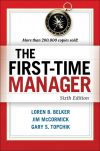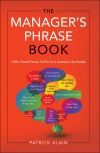Правообладателям!
Представленный фрагмент книги размещен по согласованию с распространителем легального контента ООО "ЛитРес" (не более 20% исходного текста). Если вы считаете, что размещение материала нарушает ваши или чьи-либо права, то сообщите нам об этом.Читателям!
Оплатили, но не знаете что делать дальше?
Текст бизнес-книги "The Leader Phrase Book: 3000+ Powerful Phrases That Put You In Command"
Автор книги: Alain Patrick
Раздел: Зарубежная деловая литература, Бизнес-книги
Возрастные ограничения: +12
Текущая страница: 1 (всего у книги 1 страниц)
Patrick Alain
The Leader Phrase Book
Praise for The Leader Phrase Book
“A truly useful reference book that any white-collar worker should have close to hand.”
– Dayne Cowan, Chair of the UK Section of the Visual Effects Society
“Now is your chance to learn the phrases that will make you a success.”
– David Kunkler, number-one best-selling video game producer
“A snapshot into how little it takes to quickly master the nuances of language.”
– George Bitar, multi-awarded plastic surgeon
To the leaders of the world.
Acknowledgments
The most special thanks belong to my wife, Zaina, for her selfless love, her support, and her company during the preparation of this unique text.
Thank you also to my little daughter, Michèle, with whom I have shared so many special moments. Michèle, you are drop-dead gorgeous and you rock my world! You initiated me into fatherhood and you are the best thing that has ever happened to me.
I would like to thank Tom Carroll and Michelle Lara, who were always on call when I needed them. I am grateful for their guidance.
A very big acknowledgement goes to my developmental editor, Kirsten Dalley, for making the editing phase of this book so enjoyable, and for her tireless efforts on this project’s behalf.
I would like to thank Lina and Bassam, both of whom have helped me get to this point.
No words should be wasted, and thanks to you, dear readers, hopefully mine have not been. I want to acknowledge you here, even if I don’t know any of you by name.
Preface
Being thrust into an unpredictable situation can be extremely difficult, and this is doubly true when you are a leader. Regardless of whether you are an executive, a manager, a coach, a lawyer, a doctor, a politician, a salesperson, a diplomat, a den mother, or the head of a nation, you are expected to be able to take charge, influence the situation, settle the score, and make things better. This isn’t always easy, and it can be especially stressful if you are fumbling for words and/or lacking in nuance in your communications. The fact that you reached for this book means that you probably aren’t satisfied with the status quo. You know you can do better, but you need the magic phrases to help get you there. And because you are busy, you need a quick and easy guide to help you shine, both inside and outside of the office.
This book enumerates specific responses that have helped leaders and decision-makers like you shine. There is no other book out there like it. My goal in writing this book was to share these talking points so that you can develop a trustworthy, convincing leadership presence in any situation that life throws at you. In the past, rising executives used to spend time at seminars and conferences to gain the knowledge they needed to advance in their fields. The pace of business today has rendered this strategy largely out of date. The higher you move up the chain of command, the more readily you will need to be able to summon powerful and effective words and phrases – to motivate, to inspire, to command. Ideally they should become second nature, a part of your everyday routine. To help you do that, this book is organized into seven easy-to-digest sections, plus one bonus section at the end.
The fact is no matter how successful you are, chances are your speaking (and listening) skills could use some polishing and finetuning. This invaluable tool will enhance your command of the English language and allow your confidence and leadership skills to shine through. I can promise a rewarding experience, both personally and professionally, as you learn to speak boldly, persuasively, and, perhaps most of all, appropriately in any situation.
Let our journey to powerful communications begin!
How to Use This Book
This book was designed with flexibility in mind. You can read it all the way through to get a general overview of the topic, or you can work on one particular situation or aspect of communication that you find the most challenging or relevant. For example, you may feel very comfortable addressing the public in challenging times, but not as relaxed handling conflicts with others. Use the Contents and the Index to help you find the area that is most applicable to your situation.
Read all the sample phrases and familiarize yourself with the ones that seem the most natural or comfortable for you. Then, practice them until they flow naturally from your mouth. When the time comes, you’ll have no trouble summoning them and using them with confidence and aplomb. If you like, you can also add your own catch phrases in the margins; after all, everyone says things slightly differently. Remember that meaning is both expressed in and influenced by tone, body language, and timing (context). Thus, a humorous phrase that would be effective and appropriate in one setting could be construed as hostile and inappropriate in another, depending on how it is said, to whom you are speaking, and so on. So even though these phrases are “ready-to-use” in a certain sense, it is not a one-size-fits-all scenario. Use good judgment and let context be your guide. This is particularly important when you are considering using humor as a rhetorical device. Humor can sometimes come across as flip or dismissive, and not everyone will “get” your style. As always, nuance is required.
The visual accompanying each situation will help you anchor each “order of magnitude” in your mind, which will serve as a valuable mnemonic device down the road. For example, in the sample on page 17, the continuum indicator goes from Conciliatory to Argumentative. All of the phrases are sorted incrementally in terms of this scale. If you want to build bridges and smooth things over, learn and use the phrases toward the top. If you want to eliminate or ignore the niceties and cut to the chase, use the phrases toward the bottom.
Finally, I thought it important to note that I am not just working within the parameters of what is considered proper usage; thus, the reader will find colloquialisms and some slang. This is the English language as many people understand and use it in America. Obviously, the vagaries of expression will be much different in, say, Canada or Australia, or even in different parts of the States. Ultimately, our language, like all others, is a living thing. The field of linguistics is therefore in constant flux, with new words and idiomatic phrases continually being created, fine-tuned, modified, and, in some cases, eventually discarded. Therefore I’m prepared for the fact that the material in this book will need updating from time to time, as the way we express ourselves inevitably evolves. Please visit my Website, www.patrickalain.com, for the most up-to-date information to add to your linguistic arsenal. I also welcome your comments and criticisms of this work to help me in that process.
When Someone Is Picking a Fight
CONCILIATORY
ARGUMENTATIVE
• Clearly I have offended you; I am so sorry!
• I certainly did not mean to offend you.
• You seem really upset – what can I do to remedy the situation?
• Let’s keep this professional.
• I would rather work this out in a more civil fashion.
• I really would rather not escalate this any further.
• You don’t have to act this way, you know.
• There is still time to salvage this situation.
• A true professional puts his/her personal issues aside.
• You need to think about someone else besides yourself.
• Other people have feelings besides you, you know.
• You seem to be on the warpath today – I’d better stay out of your way.
• If you’re looking for a fight, I’d be more than happy to oblige.
• If you are looking for trouble, you’ve found it!
• Boy, someone sure woke up on the wrong side of the bed.
PART 1
General Conversation
A good conversationalist says what someone wants to remember.
– John Mason Brown
Speaking well is an important skill to master. When you speak, it is crucial to not only say the right thing, but to avoid common pitfalls. Here are six invaluable tips to help you speak like a leader:
1. Speak clearly and briefly
Ordinary people who aspire to be leaders should express their thoughts with clarity and brevity. No one likes someone who hogs a conversation or who speaks in circles and endless tangents. Donald Trump, CEO and chairman of The Trump Organization, is a good example of a clear speaker. He doesn’t try to blind anyone with meaningless words, but rather comes right at you with straight talk. As he wrote in his book How to Get Rich, “[B.S.] will only get you so far.” That is a clear thought in a few simple words. I couldn’t have said it better myself!
2. Expand your vocabulary
Don’t ever think that you have finally attained a great vocabulary. Make a commitment to learn one or two new words every day. Read magazines and books and underline words you don’t know; learn their meanings and practice ways to include them in your everyday speech. If you know, say, a thousand more words than the average person, it will make you stand out from the crowd. You’ll have the vocabulary of a leader.
3. Gain command of the idiom
Cultivate the nuances of your language and show them off. This is a process, not a goal. Whenever possible, incorporate colorful and vivid idiomatic phrases and terms – a “New York minute,” “punch drunk love” – into your spoken shorthand (being careful to avoid clichés, of course). This will make your communications that much more memorable and persuasive.
4. Delegate your communications whenever possible
The higher leaders get in the organizational food chain, the more risk they assume. Much more is riding on every communication than when they were, say, working in the mail room or as a minion on the sales team. Their words can create a cascade of positive effects or get them crushed as flat as a flounder. They can make the top story on the evening news or the front page of a scandal rag. Their words can create comfort or bring despair. The impact of what they say increases exponentially with their visibility, which is why many corporate and political leaders delegate many of their external communications to their PR handlers. If you can do this, by all means take advantage of it.
Конец ознакомительного фрагмента.
Текст предоставлен ООО «ЛитРес».
Прочитайте эту книгу целиком, купив полную легальную версию на ЛитРес.
Безопасно оплатить книгу можно банковской картой Visa, MasterCard, Maestro, со счета мобильного телефона, с платежного терминала, в салоне МТС или Связной, через PayPal, WebMoney, Яндекс.Деньги, QIWI Кошелек, бонусными картами или другим удобным Вам способом.
Внимание! Это ознакомительный фрагмент книги.
Если начало книги вам понравилось, то полную версию можно приобрести у нашего партнёра - распространителя легального контента ООО "ЛитРес".Правообладателям!
Представленный фрагмент книги размещен по согласованию с распространителем легального контента ООО "ЛитРес" (не более 20% исходного текста). Если вы считаете, что размещение материала нарушает ваши или чьи-либо права, то сообщите нам об этом.Читателям!
Оплатили, но не знаете что делать дальше?







